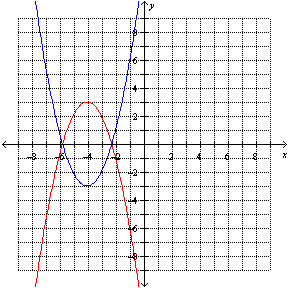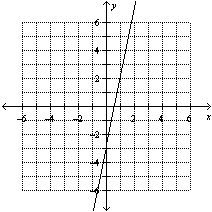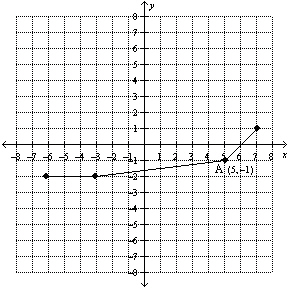Multiple Choice
Identify the
choice that best completes the statement or answers the question.
|
|
|
1.
|
The two functions in the graph shown are reflections of each other. Select the
type of reflection(s).  A | a reflection in the line y = x | C | a reflection in the
y-axis | B | a reflection in the x-axis and the y-axis | D | a reflection in the
x-axis |
|
|
|
2.
|
Which choice best describes the combination of transformations that must be
applied to the graph of  to obtain the graph of  ? A | a horizontal stretch by a factor of 2 and a horizontal translation of 2 units to the
left | B | a horizontal stretch by a factor of  and a horizontal translation of 4 units
to the right and a horizontal translation of 4 units
to the right | C | a horizontal stretch by a factor of  and a horizontal translation of 2 units
to the right and a horizontal translation of 2 units
to the right | D | a horizontal stretch by a factor of –2 and a horizontal translation of 2 units
to the right |
|
|
|
3.
|
Which of the following graphs represents the graph of the function 
transformed to  ?
|
|
|
4.
|
Which of the following relations is the correct inverse for the function  ?
|
|
|
5.
|
Which graph represents the inverse of the function shown? 
|
|
|
6.
|
Compared to the graph of the base function  , the graph of the
function  is translated A | 9 units to the right | C | 9 units down | B | 9 units up | D | 9 units to the
left |
|
|
|
7.
|
Given the graph of f( x) shown below, what are the coordinates of
point A if the transformed graph is represented by  ? 
|
|
|
8.
|
When b > 0, the function  has what relationship to the base
function  ? A | f(x) is stretched vertically by a factor of |b| and reflected in the
x-axis | B | f(x) is stretched vertically by a factor of |b| | C | f(x) is
stretched horizontally by a factor of 1/|b| and reflected in the y-axis | D | f(x) is
stretched horizontally by a factor of 1/|b| |
|
|
|
9.
|
What are the coordinates of the invariant point(s) when the function  is
reflected in the y-axis? A | (2, –2) | C | (0, –2) | B | (–2, 0) and (2, 0) | D | (0, 2) |
|
|
|
10.
|
Compared to the graph of the base function  , the graph of the function
 is translated A | 9 units to the left and 4 units down | C | 9 units to the right and 4 units
up | B | 4 units to the left and 9 units down | D | 4 units to the right and 9 units
up |
|
Short Answer
|
|
|
1.
|
Determine the equation, in standard form, of each parabola after being
transformed from  by the given translations. a) 4 units to the
right and 3 units up b) 2 units to the left and 1 unit up c) 2 units down and 7
units to the left
|
|
|
2.
|
For each function f( x), i) determine  ii) ii)
graph f( x) and its inverse a)  b) b) 
|
Problem
|
|
|
1.
|
Consider the function  . a) State the domain and range
of the function. b) Use this information to determine the domain and range of the inverse
of the function. c) Determine the inverse of the function. d) Graph the function
and its inverse on the same set of axes (include the line y = x to verify the inverse).
|
|
|
2.
|
Draw a graph to determine the invariant points of  when it is reflected in
the a) x-axis b) y-axis
|
|
|
3.
|
The equation  can be used to convert between Celsius and Fahrenheit
temperatures, where x is the temperature in degrees Celsius and y is the temperature in
degrees Fahrenheit. a) Determine the inverse of this equation. What does it represent? What
do the variables represent? b) Graph the original and inverse functions on the same set of
axes. c) Which temperature is the same in Celsius and Fahrenheit? Explain how you
know.
|